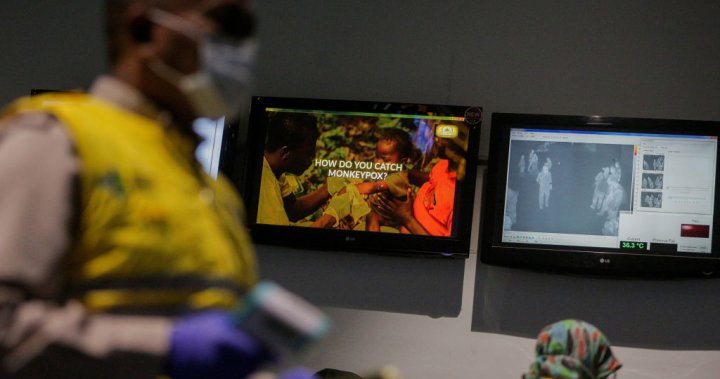Monkeypox cases are now suspected in U.K., Spain, Portugal — here’s what you need to know – National | Globalnews.ca
Cases of monkeypox are emerging in the U.K., Spain and Portugal, raising concerns about further transmission of the monkeypox virus.
Health officials in Spain issued a national alert today “to guarantee a swift, coordinated and timely response” after eight men started showing symptoms of the viral infection.
These cases have yet to be officially confirmed, and a spokesperson for Madrid’s regional health department said that the National Microbiology Centre is working to determine a final diagnosis.
The U.K. announced on Monday that they have detected four more cases of monkeypox, bringing the country’s total up to seven cases. The first case in the U.K. was detected on May 4.
Read more:
Food, shelter push inflation in Canada to 6.8% in April: Statistics Canada
In Portugal, five cases of monkeypox have been found, with 15 more people being tested. National authorities said that everyone affected is in stable condition, and that all 20 cases were among men who live in Lisbon and the Tagus Valley.
Fernando Simón, an epidemiologist who leads Spain’s health emergencies centre, said that monkeypox is unlikely to spread significantly, but wider transmission “can’t be ruled out.”
The U.K Health Security Agency said in a press release that monkeypox is “usually a mild self-limiting illness” that doesn’t spread easily.
“The risk to the UK population is low.”
Read more:
Can Turkey stop Finland, Sweden from joining NATO? Why it’s seeking ‘bargains’
What is monkeypox?
Symptoms of monkeypox include fever, headache, fatigue and muscle aches, according to the Centers for Disease Control and Prevention (CDC). The organization says that after one to three days of fever, sufferers of monkeypox can develop a facial rash that then spreads to other parts of the body as lesions, which later fall off.
The incubation period for monkeypox is usually seven to 14 days, but can range as wide as five to 21 days.
While there is no cure for the virus, most people recover from a monkeypox infection within a few weeks. In Africa, where the disease is most prevalent, up to one in 10 people die after contracting the virus.
Read more:
Canada’s top court says voluntary extreme intoxication a defence in violent crimes
How is it transmitted?
“Generally speaking, monkeypox is spread by respiratory transmission, but the characteristics of the eight suspected cases point towards fluid contact,” a spokesperson for Madrid’s health department said.
“The eight suspected cases in Madrid are among men who have sex with men. They are doing well but this illness can require hospital treatment.”
Mateo Prochazka, an infectious disease epidemiologist at the U.K. Health Security Agency (UKHSA), confirmed that four people who were diagnosed with monkeypox in the U.K. are gay or bisexual. Prochazka says this points to the disease being “spread in sexual networks.”
“This is further suggested by the fact that common contacts have been identified for only 2 of the 4 latest cases,” he added on Twitter. He said that acquiring the disease via sexual contact “is a novel route of transmission.”
Prochazka stresses that monkeypox is spread through close contact, and there is not enough evidence to prove that the virus has morphed into a sexually transmitted infection (STI).
“Close contact between two people (such as during sex) could also facilitate transmission — but this has never been described before.”
UKHSA is warning gay and bisexual men “to be aware” of any rashes or lesions, and recommend contacting a sexual health clinic if symptoms emerge.
The CDC says that monkeypox can also be transmitted from animals to humans via bites, scratches, preparation of bush meat, and direct contact with body fluids or lesions.
Read more:
Amber Heard leaves stand after tense cross-exam by Johnny Depp’s lawyers
Why is monkeypox back?
Monkeypox was first identified in 1958 after researchers identified two outbreaks of a pox-like disease among the monkeys they were using as test subjects. The first human case of monkeypox didn’t come until 1970 in the Democratic Republic of the Congo, according to the CDC.
Since then, monkeypox has been detected in several other central and west African countries.
The first case of monkeypox to emerge in Europe during this most recent outbreak occurred in the U.K. on May 4. A man likely contracted the virus in Nigeria and flew to the U.K.
Read more:
Researchers say they’ve found the reason why infants die from SIDS
The first time that human monkeypox was reported outside of Africa was during a 2003 outbreak in the U.S. Forty-seven people contracted or were suspected to have contracted monkeypox after contact with infected prairie dogs.
Jennifer McQuiston, a senior CDC official, said that the department is considering issuing a health alert to medical professionals and clinics in the U.S.
“There’s a lot of travel between the U.K. and the United States and other global areas. So I think our concern is that given that you do have four cases among men who have sex with men, that we probably need to be thinking about messaging to our STI clinics … about what to be on the lookout for, what to be alert for,” she said via STAT News.
Read more:
Another spike in suspect COVID-19 cases reported in North Korea
“This is certainly a population that has been stigmatized for sexually transmitted infections like HIV in the past. And I think we have learned a bit from those experiences about how to approach this with the type of sensitivity it requires,” she said.
Prochazka also spoke about the need to be mindful of rhetoric around monkeypox that may lead to stigma.
McQuiston confirmed that there are no cases of monkeypox currently in the U.S., but six U.S. citizens are being monitored for symptoms because they were on the same flight as the man who was the U.K.’s first case.

© 2022 Global News, a division of Corus Entertainment Inc.
For all the latest health News Click Here




